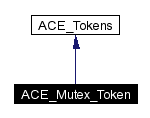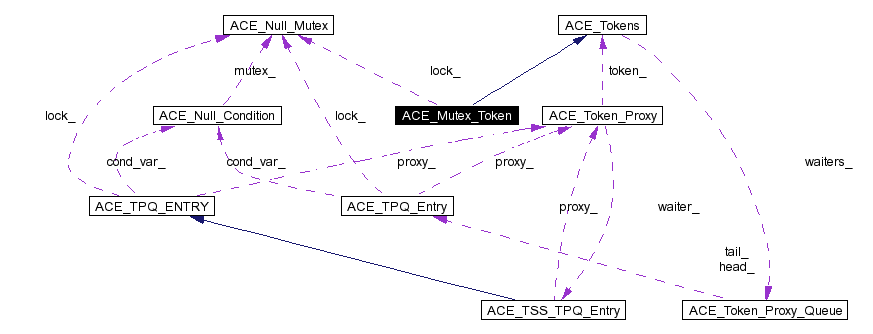
#include <Local_Tokens.h>
Inheritance diagram for ACE_Mutex_Token:


Public Methods | |
| ACE_EXPLICIT | ACE_Mutex_Token (const ACE_TCHAR *name) |
| Constructor. | |
| virtual | ~ACE_Mutex_Token (void) |
| Destructor. | |
| virtual int | acquire (ACE_TPQ_Entry *caller, int ignore_deadlock, int notify) |
| virtual int | tryacquire (ACE_TPQ_Entry *caller) |
| Same as acquire, but fails if would block. | |
| virtual int | renew (ACE_TPQ_Entry *caller, int requeue_position) |
| virtual int | release (ACE_TPQ_Entry *caller) |
| void | dump (void) const |
| Dump the state of the class. | |
| virtual int | type (void) const |
| Returns ACE_Tokens::MUTEX. | |
| virtual int | owners (OWNER_STACK &o, const ACE_TCHAR *id) |
| virtual int | is_waiting_for (const ACE_TCHAR *id) |
| Returns 1 if <id> is waiting for this token. 0 otherwise. | |
| virtual int | is_owner (const ACE_TCHAR *id) |
| Returns 1 if <id> is an owner of this token. 0 otherwise. | |
Private Attributes | |
| ACE_TOKEN_CONST::MUTEX | lock_ |
| ACE_Mutex_Token used to lock internal data structures. | |
Not a public interface. This class is a more general-purpose synchronization mechanism than SunOS 5.x mutexes. For example, it implements "recursive mutex" semantics, where a thread that owns the token can reacquire it without deadlocking. In addition, threads that are blocked awaiting the token are serviced in strict FIFO order as other threads release the token (SunOS 5.x mutexes don't strictly enforce an acquisition order).
|
|
Constructor.
|
|
|
Destructor.
|
|
||||||||||||||||
|
Returns 0 on success, -1 on failure with <ACE_Log_Msg::errnum> as the reason. If errnum == EWOULDBLOCK, and notify == 1, <ACE_Token_Proxy::sleep_hook> has been called on the current owner of the token. If ignore_deadlock is passed as 1 and errnum == EDEADLK, then deadlock was detected via ace_token_manager. Implements ACE_Tokens. |
|
|
Dump the state of the class.
Reimplemented from ACE_Tokens. |
|
|
Returns 1 if <id> is an owner of this token. 0 otherwise.
Implements ACE_Tokens. |
|
|
Returns 1 if <id> is waiting for this token. 0 otherwise.
Implements ACE_Tokens. |
|
||||||||||||
|
Returns a stack of the current owners. Returns -1 on error, 0 on success. If <id> is non-zero, returns 1 if id is an owner. Implements ACE_Tokens. |
|
|
Relinquish the token. If there are any waiters then the next one in line gets it. If the caller is not the owner, caller is removed from the waiter list. Implements ACE_Tokens. |
|
||||||||||||
|
An optimized method that efficiently reacquires the token if no other threads are waiting. This is useful for situations where you don't want to degrade the quality of service if there are other threads waiting to get the token. If <requeue_position> == -1 and there are other threads waiting to obtain the token we are queued at the end of the list of waiters. If <requeue_position> > -1 then it indicates how many entries to skip over before inserting our thread into the list of waiters (e.g., <requeue_position> == 0 means "insert at front of the queue"). Renew has the rather odd semantics such that if there are other waiting threads it will give up the token even if the nesting_level_ > 1. I'm not sure if this is really the right thing to do (since it makes it possible for shared data to be changed unexpectedly) so use with caution... Returns 0 on success, -1 on failure with <ACE_Log_Msg::errnum> as the reason. If errnum == EWOULDBLOCK, and notify == 1, <ACE_Token_Proxy::sleep_hook> has been called on the current owner of the token. Implements ACE_Tokens. |
|
|
Same as acquire, but fails if would block.
Implements ACE_Tokens. |
|
|
Returns ACE_Tokens::MUTEX.
Implements ACE_Tokens. |
|
|
ACE_Mutex_Token used to lock internal data structures.
|
 1.2.18
1.2.18